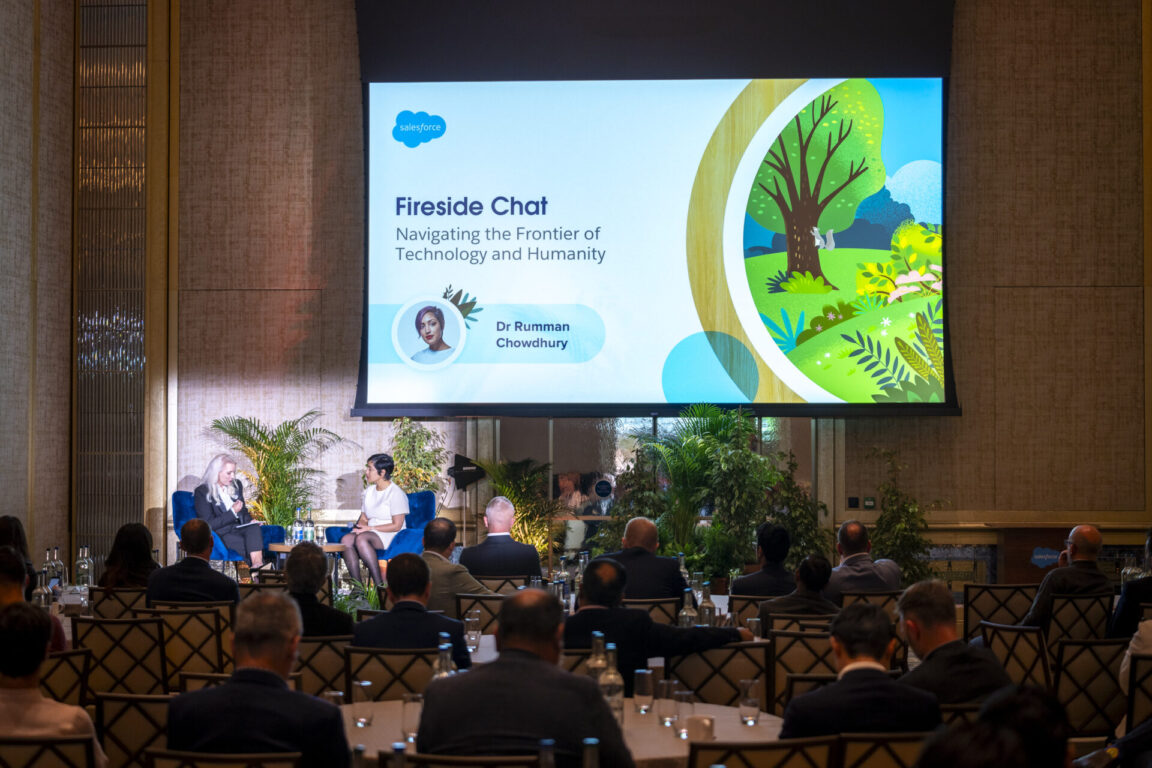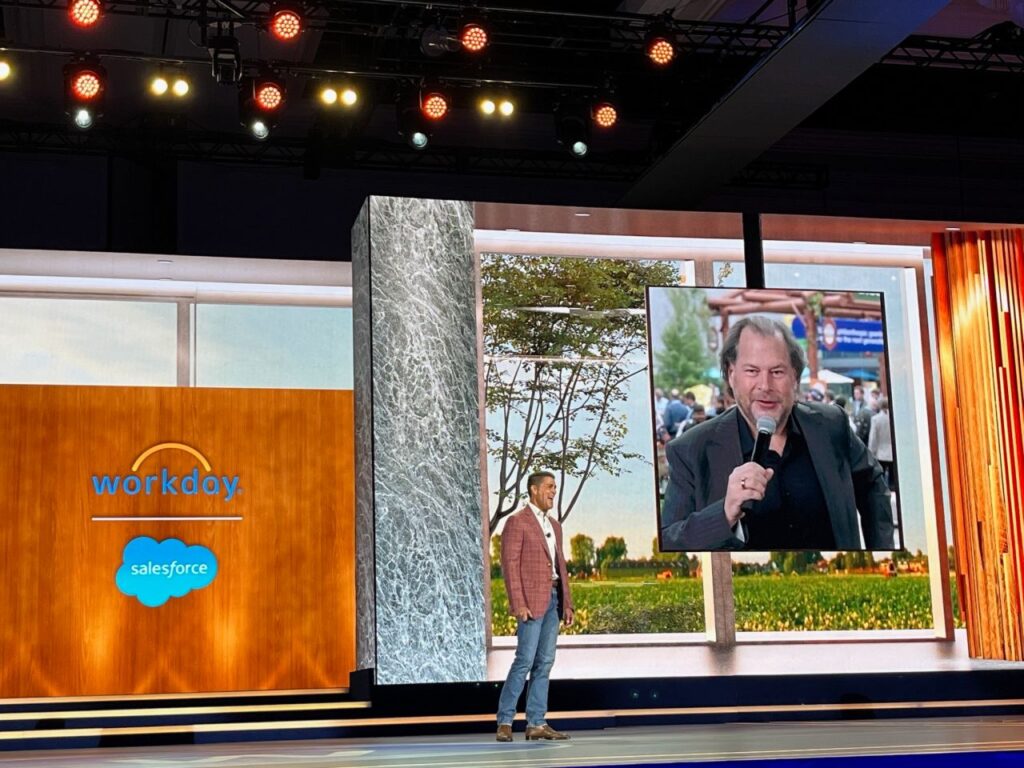Salesforce CEO: ‘I’ve never worked on anything more exciting’ than this new wave of AI
In the past month, UNLEASH has been invited to multiple, exclusive Salesforce press events – here are our takeaways from conversations with Salesforce’s CEO, CEO for UK&I and EVP of Product, as well as the tech giant’s partner Workday’s CEO, about the latest AI innovation: Agents.
Salesforce Insights
Salesforce is pioneering a new wage of AI: agents.
UNLEASH has attended multiple press briefings and forums to find out more from the tech giant about the impact of this new form of AI on companies, and their people.
Here are some insights from those events, and conversations, with Salesforce CEO Marc Benioff, UK&I CEO Zahra Bahrololoumi, EVP of Product, Patrick Stokes, as well as Salesforce customers and Workday CEO Carl Eschenbach.
By 2030, the AI could contribute $19.9 trillion to the global economy and drive 3.5% of global GDP. That’s according to data from IDC.
Clearly, there are huge business opportunities from AI – but, as Salesforce Co-Founder and CEO Marc Benioff shared in a press conference a few weeks ago, business are struggling to get the results and value they want from AI.
The invite-only press briefing happened ahead of Salesforce’s 45,000-attendee strong Dreamforce conference in San Francisco in mid-September.
Salesforce has pioneered the first two waves of AI – predictive and co-pilots – and now, to help organizations truly reap the rewards from AI, the tech giant is launching the third wave: agents.
Benioff shared that businesses have been sold the vision of copilots over the past few years, but “AI cannot be a bolt on”.
Instead, companies need to truly find ways for humans and AI agents to “work together for the first time” – not only will this give people so much time back, but it will be able to create workforces without limits.
That was the message from Salesforce UK&I CEO Zahra Bahrololoumi CBE at the tech giant’s Executive Forum in London this week – UNLEASH was among select media in attendance.
She described this third wave of AI as an “a new inflection point” where “autonomous AI work along side as logical extensions of our teams”.
For Benioff, in this new world of AI, there is no need for companies to spend years “trying to DIY their AI”. Instead, Salesforce’s argument is that they can leverage this powerful technology from within the existing Salesforce platform, in an environment that businesses are already used to.
This is “what AI was meant to me”, notes Benioff. During the September press conference, Benioff stated: “I’ve never worked on anything more exciting” – this is “not just another piece of software”.
The potential impact is so profound that Benioff is, in fact, tempted to rename Salesforce as ‘Agentforce’.
Salesforce on the people side of AI
The power of AI comes from its potential to help organizations out of a situation where they have spiraling costs, constrained workforce (which are overwhelmed and burnt out), and rising customer experiences.
For Salesforce, the answer is having agents now work alongside “as logical extensions of our teams”. They can do the routine, low value work, and leave the humans to do more meaningful tasks.
It sounds great – but is it the reality for most workers across the world? Are they ready to work alongside agents? Are they worried about their job security? Do they know how to use AI in the right ways, given a complicated regulatory situation?
UNLEASH put the people element of AI to Bahrololoumi and EVP of Product & Industries Marketing Patrick Stokes at the Executive Forum event in London.
Bahrololoumi tells UNLEASH that “some people are fearful”, and that this largely comes from issues with trusting the AI.
Trust is a core value at Salesforce, so that is a top priority for the tech giant – during an earlier session, Bahrololoumi promised that “your data is not our product”, and it never will be.
“Having that trust layer that we’ve got built in means that people can feel much more confident and secure” about the use AI in their work.
Stokes adds that people are more likely to experiment and adopt AI if they could trust they are doing so in a safe environment – when Salesforce starting building out the agents technology, they started with the trust layer.
The LLM does not retain [any] of the information that you send it. We get the data when we need it, we give the LLM the context, then it forgets it”, which makes it easier to maintain governance over that environment, note Stokes.
Responsible and ethical AI was the focus of the closing session at the Salesforce Executive Forum in London.
Dr Rumman Chowdhury, AI expert and advisor, as well as CEO of Humane Intelligence, shared her perspectives on how AI could be a “great equalizer”, but there is still a need to keep ethics of AI.
She spoke about the concept of “a right to repair” – “if the agent is not working for you, what is your right to ask for accountability to ensure that it does the right thing?”
There is a need for humans to keep like they have some agency and ownership of how AI is being used in their lives.
In the workplace, this involves organizations having “a clear line of accountability”, and the team responsible for AI needs to be very close to the C-Suite (this is not just tone from the top, but genuine commitment).

Dr Chowdhury on stage at Salesforce Executive Forum. Credit: IPVisuals
Another element of trust with AI is skills – there is a need for business, government and educational institutions to work together to help people acquire digital skills, notes Bahrololoumi.
The aim, according to Benioff, is to “take normal people and make them great AI people” – “we want everyone to be a trailblazer when it comes to technology”, and they do that by reskilling and upskilling in digital skills.
At the end of the day, AI is not here to replace humans – it is about “making employees better and more efficient” – “the technology is awesome, but it is about humans with AI driving that success together”, as Benioff stated during the pre-Dreamforce press conference.
Stokes agrees. “Anytime you have these technology shifts, you have labor shifts as well. Labor is going to move from low value to higher value work. I think it would be naive to assume that it be a net loss [of jobs].”
This conversation around AI and people also happened during a customer panel earlier in the London Executive Forum event.
Rob Pickering, CTO at Tottenham Hotspur Football Club shared that while there are concerns about AI, “there’s a lot of optimism”, and a willingness to learn (even from non-technologists). Internal mobility, and reskilling and upskilling your existing people, who are loyal and know your business and your customers inside out, is key.
“It is much more valuable having people with the business content and then skilled up with the technology skills than it is trying to bring the technology skills in and then get someone used to a new business”.
Sharon Prior, CIO at Heathrow Airport, agreed on the need for upskilling of long-tenured employees in the realm of tech.
The airport group is therefore creating “fusion teams” that leverage technology – this ensures that this AI transformation isn’t just benefiting the IT functions but is dispersed across the whole organization.
Prior shares that there’s been a lot of interest around AI at Heathrow – “everyone wants AI” – but a big focus for her team is to put those guardrails around its use, and publishing its first AI policy document.
Neobank Revolut’s CRO Matthew Acton-Davis echoed this. He shared that Revolut has created “pods” that “migrate people from pre-existing function…into this new world” of work.
Salesforce can’t do AI alone
Salesforce is not alone in its journey to pioneer a new agent wave of AI – it is partnering not only with customers, but also other tech vendors.
One standout example is Workday – this was noted on the Executive Forum main stage, as well as front and center at Workday Rising a few weeks ago in Las Vegas.
UNLEASH was at Workday Rising and saw the HR tech giant launch its new AI platform – Illuminate – as well as four new agents: Recruiter Agent, Expenses Agent, Succession Agent and Workday Optimize – on the main stage.
Plus, Workday’s CEO Carl Eschenbach brought Benioff into the conference by inviting Benioff to Rising (via video link) to discuss the partnership with Salesforce, as well as their shared vision for an AI agent-powered future of work.

Salesforce CEO Marc Benioff joins Workday CEO Carl Eschenbach on stage at Workday Rising in Las Vegas in September.
In the main stage chat, Benioff stated: “This has been the dream of my whole career, to get Workday and Salesforce together.”
It is clear that “these agents aren’t just going to transform human productivity, it is going to drive business transformation”, added Eschenbach.
“You’re talking the same language as us,” he adds. Benioff agreed: “When you become the CEO of Workday, it became clear as day to both of us that we could do things together that we were not able to do separately.”
Benioff concluded: “We’re on the precipice of AI, and we need to move it forward” to create incredible experiences for customers, and the workforce more widely.
Sign up to the UNLEASH Newsletter
Get the Editor’s picks of the week delivered straight to your inbox!

Chief Reporter, UNLEASH
Allie is an award-winning business journalist and can be reached at alexandra@unleash.ai.
Contact Us
"*" indicates required fields
Partner with UNLEASH
"*" indicates required fields